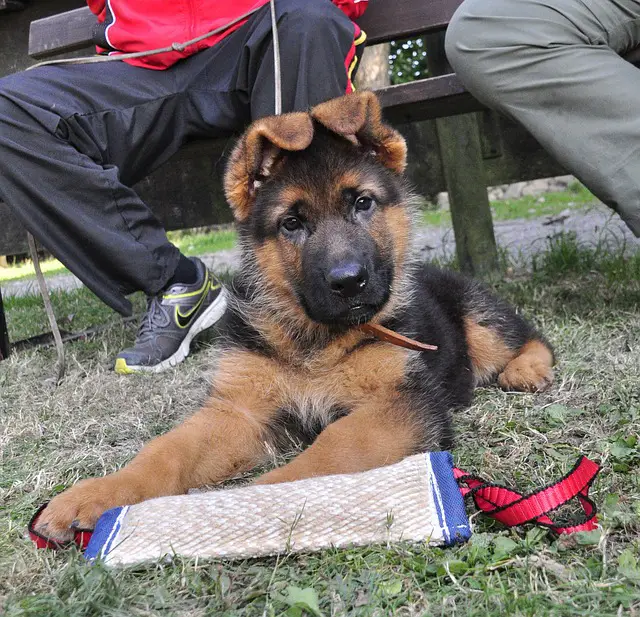Nipping can lead to negative consequences for you, your GSD (German Shepherd Dog) and the wider public + other dogs.
It is completely normal for German Shepherd puppies to gently mouth you, and the objects around the house.
But, if this behavior isn’t managed from a young age, an adolescent and/or adult dog can cause serious damage.
We’ve outlined 5 methods you might consider to manage this behavior if it isn’t too serious.
If you suspect the issue is serious enough to cause harm/danger, seek a vet or animal professional’s immediately.
A complimentary guide to this one might be our main guide on how to train a German Shepherd, including top tips, and advice from a professional dog trainer. You might get some additional training pointers from reading this guide.
Let’s look at ways to potentially stop nipping and biting!
(NOTE: this is a general informational and educational guide only. It is not professional advice. See a vet or qualified animal expert/trainer for professional advice).
Why Is My German Shepherd Puppy Biting Other People and Me?
Teething for puppies leads to them looking for things to chew on.
Dogs are different to humans because they prefer to inspect things with their mouth first and not their paws – whereas, we use our eyes and hands.
Nipping can start out as cute, but it quickly gets painful, especially when it draws blood
Luckily, there are various ways you can deal with your GSD puppy’s nippy behavior.
My German Shepherd Puppy Won’t Stop Biting: 5 Ways You Can Manage a Nippy German Shepherd Puppy
1) Inhibit the Biting
If you watch puppies playing with each other, one will make a ‘yelp’ noise when the other nips it too hard.
This instinctually causes the biting puppy to release its grip.
You might practice letting your hand go limp, and imitating the yelp sound.
As soon as your GSD puppy releases, discontinue play for twenty seconds, and go back to playing again.
Try not to pull your GSD’s mouth away causing it to chase your hand.
If your GSD puppy is nipping you regularly, after three ‘yelps’, you should discontinue play altogether.
You want to reward gentle play, and phase out rough play.
Try not to yell at or aggressively discipline your GSD.
Firm but calm leadership is the key.
2) Re-direct
Your GSD is a natural herding dog, so chances are he or she might like to chase you at times.
Whether its chasing you, or in general play, have a toy ready and place it where your GSDs mouth is when it goes to nip you.
You are replacing what would usually be a bite with an acceptable action. This is called re-direction.
Remember, you should teach your GSD to ‘drop’ an object in its mouth so at anytime you can retrieve things from it when required.
3) Distraction
Whether it’s you or items around your house, if your puppy has plenty of toys to chew on and ways to stay stimulated, this can minimize the biting of you and destruction of furniture and the like before it occurs.
Socializing your GSD from a young age is also important in teaching your GSD how to behave around other animals, and not to bite them too hard.
This is especially true around adult dogs who will quickly let a puppy know when it has acted in an unacceptable way.
4) Ankle Biters
Your GSD is a herding dog, so by nature it will want to nip at your heels.
There is every chance a GSD will stop ankle biting by itself when it finishes teething, but if it doesn’t, you can train it not to.
Grab your GSD’s favourite toy or a handful of its favorite treats and begin walking with your GSD by your side.
When it begins nipping, stop walking and firmly command ‘Stop’.
When your GSD stops, wait a few seconds and reward him or her with the toy or treat.
If your GSD does not stop biting, do not react negatively, but walk away altogether, and give him or her some time by itself.
5) Deterrence
You can buy sprays and other deterrents to stop your puppy mouthing around your house.
Some flavours include Citronella and Bitter Apple.
It may sound cruel, but you don’t want your puppy to have access to water for about an hour after tasting the deterrent.
What would be the point if it could wash its mouth out straight after and not learn its lesson?
Sprays and deterrents don’t always work for all dogs.
Test it on your dog if you think it may be useful.
Friendly Disclaimer
TheDailyShep.com are not veterinarians, or animal professionals/experts. Information provided is for informational purposes only – it is not a substitute for professional or qualified advice.
The information is based on either our own thorough research, and/or own experiences, as a means of free speech.
By consuming this information, you accept that TheDailyShep.com do not have client or patient relationship with you, and TheDailyShep.com are not advising you to act on anything you read.
You should always consult your own veterinarian, animal expert, or health care professional and follow their advice before making decisions on all matters.
You can find our full set of disclaimers and T & C’s in the footer of this site.
Enjoy your reading, and thank you for being here
','' ); } ?>